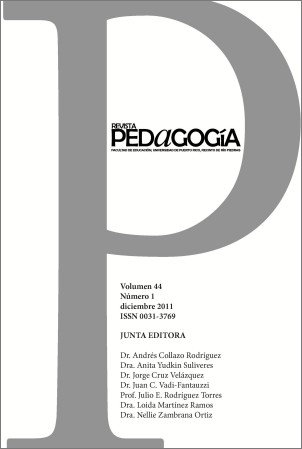Abstract
The recognition of a growing social complexity should be accompanied by the adoption of the paradigm of complexity as a central scheme of any contemporary educational project. This paper proposes a dialogic between the paradigm of complexity and the queer as signifier. Their common denominators are uncertainty and unmentionableness as constituting the world as it is, that is, the recognition of that which is not likely to be considered from any binary logic. The educational task is to place knowledge at the service of life and at the height of complexity of the present time.
How to cite:
Román, M. (2011). La complejidad es una epistemología queer. Pedagogía, 44(1), 133-140. Retrieved from https://revistas.upr.edu/index.php/educacion/article/view/16564
References
Bauman, Z. (2001). On Postmodern Uses of Sex. The Individualized Society. Cambridge: Polity.
Bauman, Z. (2003). Modernidad líquida. México DF: Editorial Fondo de Cultura Económica.
Beck, U. (1992). "I am I": Gendered space and conflict inside and outside family. En U. Beck, Risk society: Towards a new modernity (M. Ritter, trad., pp. 103-122). London: Sage Publications.
Butler, J. (1990). Gender trouble: Feminism and the subversion of identity. US: Routledge.
Derrida, J. (1992). Force of law: The "Mystical foundation of authority". En D. Cornell, M. Rosenfeld & D. G. Carlson (Eds.), Deconstruction and the possibility of justice (pp. 3-67). New York, NY: Routledge, Taylor & Francis.
Giraldo, G. (2004, septiembre). Hacia una epistemologia evolucionista. Cinta de Moebio, 20. Recuperado de http://redalyc.uaemex.mx/redalyc/src/inicio/ArtPdfRed.jsp?iCve=10102004
Labarre, A. (2006). Aprendizaje, complejidad y desarrollo: agenda curricular para enseñar en los tiempos actuales. Revista de Psicología, 15(2), 65-76. Recuperado de http://redalyc.uaemex.mx/src/inicio/ArtPdfRed.jsp?iCve=26415204
Luhmann, N. (1998). Observations on modernity. California: Stanford University Press.
Luhmann, N. (1996). Sistemas abiertos. En N. Luhmann, Introducción a la teoría de sistemas (Lecciones publicadas por Javier Torres Nafarrate,). México: Universidad Iberoamericana.
Maturana, H. & Varela, F. (1996). La organización de lo vivo. En H. Maturana & F. Varela, El árbol del conocimiento: las bases biológicas del conocimiento humano. Madrid: Editorial Debate.
Morín E. (1998). Introducción al pensamiento complejo. Barcelona: Editorial Gedisa.
Žižek, S. (1999). Passionate (Dis)Attachments, Or, Judith Butler as a Reader of Freud. The ticklish subject: The absent centre of political ontology. Londres: Verso.
The contents published in the Puerto Rico Journal of Education is freely distributed under open access practices, in accordance with the Creative Commons license, Attribution-NonCommercial 4.0 International (CC BY-NC 4.0). Through these principles, the journal and its authors allow readers to access, reproduce and share articles in full text. Users should give credit to authors in a reasonable way without suggesting they have their support. Under no circumstances, readers may make use of the contents for commercial purposes. The authors retain copyright on their works.

